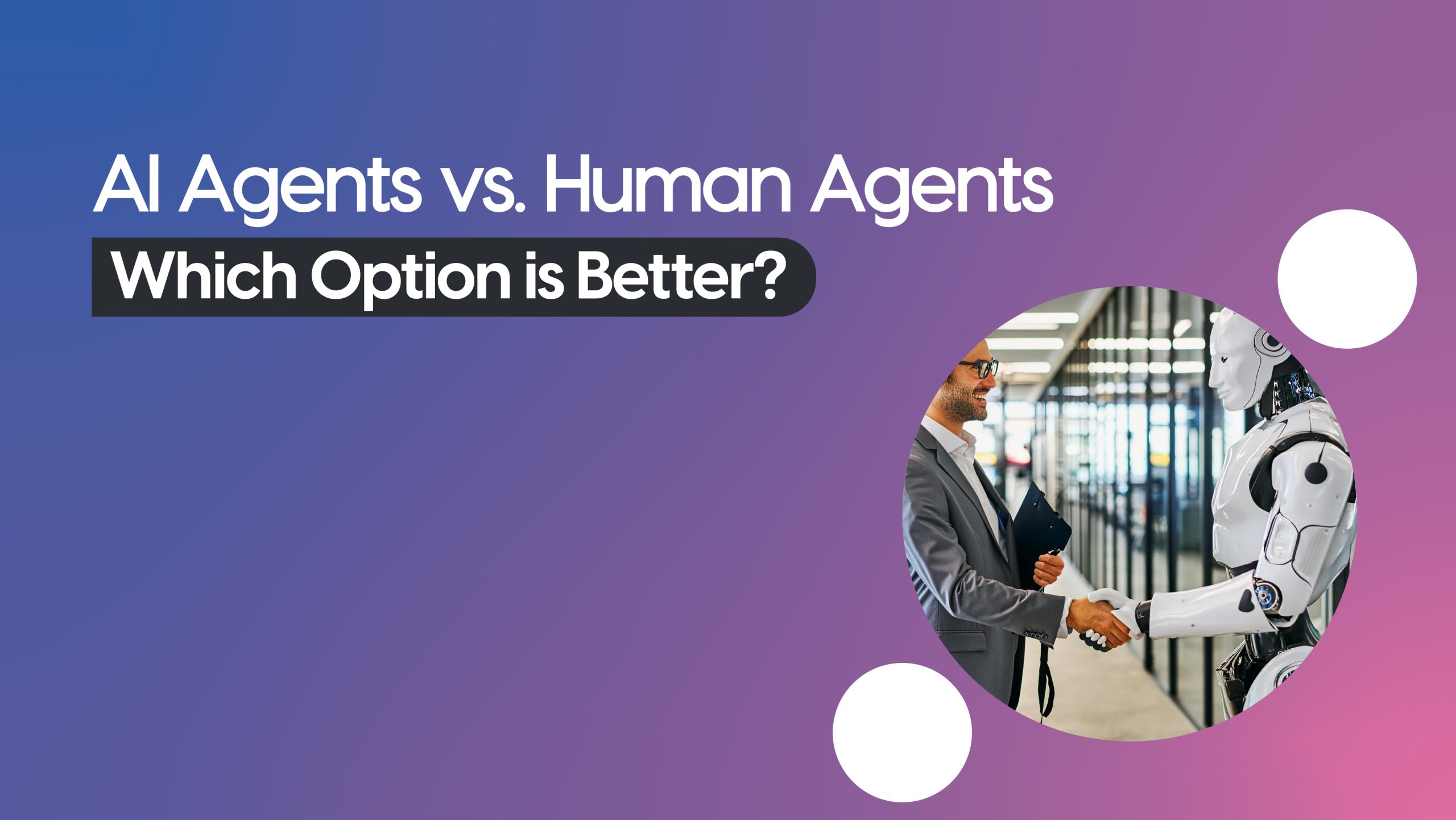AI Agents vs. Human Agents: Which Option is Better?

Sarah purchased a laptop from an ecommerce website. She was really excited about it but the order didn’t arrive on the promised date. She wanted to check her order’s status. The moment she clicked “Live Chat” on the company’s website, she expected the usual frustration, a conventional chatbot that would trap her in an endless loop of unhelpful responses. But this time, something felt different.
Chat agent: “Hi Sarah! I see your order was scheduled for delivery yesterday. Let me check on that for you.”
The response was instant, but more importantly, it felt… natural. As Sarah explained her issue, the chat agent didn’t just spit out generic replies, it asked follow-up questions, clarified details, and even acknowledged her frustration.
Chat agent: “I completely understand how frustrating that must be. Let me contact the courier and see what’s going on.”
Before Sarah could even ask, the Conversational AI-powered chat agent pulled up real-time shipping updates and provided a clear resolution. No long wait times, no being put on hold. Just fast, smart, and empathetic service.
As her issue was resolved in a matter of minutes, she realised that AI-powered customer service isn’t too bad. In fact, quite the opposite. This is just one example! Conversational AI-powered solutions are proving that chatbots doesn’t have to be just script-following machines. They can be engaging, problem-solving, and smart agents that support customers
But does this mean that we can take human agents out of the equation? Or should there be a mix of AI and human agents? Let’s find out!
But first things first… what are AI agents?
Why retailer should invest in AI-driven customer support
What are AI agents?
AI agents as autonomous intelligent systems performing specific tasks without human intervention. In the customer service context, AI agents are like always-on smart digital shopping assistants powered by advanced AI technologies, including machine learning and natural language processing.
They can engage with customers, answering everything from basic questions to more complex requests, while continuously learning and improving to provide better service each time. They can interpret the meaning behind customer queries, considering context and intent, to deliver accurate and relevant responses.
Suffice to say, they are not your regular chatbots.
But what’s the difference?
Well, traditional chatbots used to follow fixed scripts, meaning they could only respond in certain ways based on pre-set answers. If a customer asked something outside of these set responses, the chatbot would often get stuck or give irrelevant answers. This made it frustrating for customers, especially when they had more complicated issues.
Now, conversational AI has changed all of this. Instead of just following a script, AI agents use LLM technology to understand language better. This means they can handle complex questions and understand the customer’s needs.
For example, if a customer asks, “Can I return an item I bought online?”, a chatbot might give a generic response like, “Check the return policy,” but an AI agent can understand that the customer might need specific instructions, details about return windows, or assistance with creating a return label.

AI Agents vs. Human Agents: Which Option is Better?
When considering whether to use AI agents or human agents for customer service, it’s important to look at several factors, including costs, efficiency, performance, and scalability.
Costs
Human agents in the UK typically earn, on average, £24,183 per year, depending on their experience and the region. So, a team of four human agents would cost around £100,000. This salary does not include the costs of benefits, training, workplace amenities, or the need for regular breaks.
A customer service team also requires ongoing management, training, and recruitment efforts, all of which add to the cost.
In comparison to the cost of hiring and a human workforce, AI agents offer significant savings over time, especially for businesses handling a high number of customer interactions. They don’t require salaries, benefits, or breaks. AI agents can run 24/7 without additional costs, making it particularly cost-efficient for handling high volumes of routine inquiries.
Efficiency
Human agents can only attend to one customer at a time, which may result in longer wait times during peak periods. Even with the best training and resources, human agents are inherently limited when it comes to handling large volumes efficiently.
AI agents, on the other hand, are great in efficiency by providing immediate responses to customer inquiries, with minimal wait times. AI systems are designed to handle multiple tasks simultaneously, which significantly reduces customer wait times compared to human agents.
An IBM study show that AI-powered chatbots can handle up to 80% of routine customer inquiries without human intervention. This ability to process numerous interactions at once means that customers receive faster resolutions.
Performance
Human agents offer a level of adaptability and emotional intelligence that AI agents can’t fully replicate. They are ideal in situations that require a mix of empathy, creativity, and problem-solving, making them ideal for handling complex or sensitive customer inquiries.
For example, in cases where customers are experiencing frustration, human agents can respond with empathy and draft their responses accordingly. This human touch can lead to stronger customer relationships and higher satisfaction levels.
But human agents are also limited by factors such as fatigue, mood, and workload. Their performance can vary depending on their energy levels and the time of day, which may impact the consistency and quality of service.
Scalability
Human agents face significant challenges when it comes to scalability. As demand for customer service increases, businesses must hire and train additional agents, which can be both costly and time-consuming. Human agents also require ongoing support, such as supervisors and trainers, to ensure quality and consistency across teams.
This makes scaling a human workforce more resource-intensive, particularly for e-commerce businesses experiencing rapid growth.
AI agents, conversely, can scale effortlessly. They can handle a large number of customer interactions simultaneously and can be deployed across multiple channels, including websites and messaging apps, without requiring additional human resources.
According to McKinsey, AI-driven customer service systems can scale quickly and support business growth with minimal investment in infrastructure. They can handle up to 95% of service interactions through digital and straight-through-processing channels.
To reiterate, this makes AI a far more scalable option compared to human agents, especially in high-demand environments.
The final verdict
While human agents can be useful in complex and high-stakes scenarios, their efficiency, performance, and scalability for retail customer service are limited, even significant spending in recruitment and training.
The return on investment simply favours AI agents.
The best approach to customer service is using both AI agents and human agents together. This mix takes advantage of the strengths of humans and technology to create an optimal customer experience. AI agents can quickly handle lots of inquiries, answer common questions, and provide information about products and services.
Conversational AI-powered digital assistants are great at guiding customers through a website and offering personalised responses. Human agents, on the other hand, are better at solving complicated problems that need creative thinking and deep understanding. They can respond to customer emotions and build stronger relationships.
ASOS is a perfect example of using both AI and human agents to provide great customer service. It uses AI chatbots to handle tasks like order tracking, product recommendations, etc. This allows their human agents to focus on more complex issues, such as resolving complaints or giving personalised advice.
Converso: Your smart shopping companion
Let Converso handle the AI agent part.
Converso offers conversational AI for retail designed to help retailers turn visitors into customers. It guides shoppers from browsing to checkout, offering personalised recommendations and deals through chat or voice. This AI-driven tool anticipates customer needs, making shopping smoother and boosting sales.
Converso provides 24/7 support, answering questions and handling common queries instantly. It personalises deals and upsells based on customer behaviour, creating a unique shopping experience. Adding products to the cart is easy, which improves convenience and encourages more sales.
With Converso, retailers can automate customer interactions and handle thousands of inquiries at once. It delivers a human-like experience that boosts engagement and increases conversion rates, helping retail businesses like yourself stay ahead.
